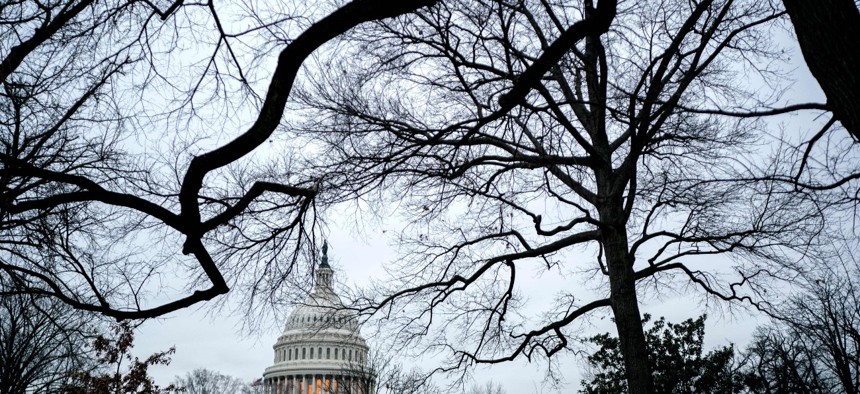Congress is heading toward yet another stopgap spending bill this week to avoid a shutdown

STEFANI REYNOLDS/AFP via Getty Images
A measure to fund agencies through March 11 will allow appropriators to get over the finish line on full-year spending, top House Democrat says.
Congress appears headed toward another stopgap funding bill, with Democrats now pushing a short-term measure to give appropriators more time to hammer out full-year spending levels.
The House is likely to vote on a continuing resolution this week, House Majority Leader Steny Hoyer, D-Md., said on Sunday. Current funding is set to expire Feb. 18 and negotiators have yet to have a breakthrough to move forward on appropriations bills for the remainder of fiscal 2022. They have expressed some notes of optimism, however, and Hoyer expressed hope that a short extension would allow for a deal and final votes while avoiding a shutdown.
“We're going to get something done,” Hoyer said on MSNBC. “It will probably be a short-term CR and it will be this coming week to give us a little more time. Negotiations are very vigorous, and I think that we're going to get agreement both on the top line—how much spending is going to be, and how it will be spent—but it's not there yet.”
The new CR will keep agencies afloat through March 11, according to text unveiled by the House Appropriations Committee on Monday. It will provide additional funding for the water supply in Hawaii, submarine building and the Interior Department's cybersecurity efforts.
While some Republicans have teased the idea of a full-year CR, which would lock in agency spending at fiscal 2021 levels that were signed into law under President Trump, Hoyer echoed fellow Democrats in calling it “absolutely essential” that Congress pass an omnibus bill to set line-by-line funding across government. Lawmakers have yet to agree on the allocations for defense and non-defense spending, a necessary precursor to finalizing the 12 appropriations bills Congress must pass each year.
Democrats have proposed big spending boosts at civilian agencies, nearly matching the 16% called for in President Biden’s budget request. They have pitched much smaller increases for Defense, which Republicans have called insufficient. The minority party is seeking parity in the defense and non-defense portions of the budget.
Top appropriators have met in recent weeks to try to reach an agreement. They have called those talks productive, but remain divided enough to no longer expect to reach the Feb. 18 deadline.
Before revealing how long the new CR would last, Hoyer said only the majority “will not allow the government to shutdown.” House Speaker Nancy Pelosi, D-Calif., said as recently as Friday she still hoped to avoid another CR and instead vote on an omnibus. Sen. Richard Shelby, R-Ala., the top Republican on the Senate Appropriations Committee, however, has consistently suggested another stopgap would be required.
Biden has already signed CRs in September and December to avoid shutdowns.
Military leaders have warned of canceled bonuses, delayed modernization plans and postponed investments in equipment and training under a year-long CR. The White House has said such an outcome would negatively impact the COVID-19 pandemic response, national security and federal hiring. Pay increases would have to come at the expense of other priorities, it said, while the Social Security Administration would institute a hiring freeze, vacancies for food safety inspectors would go unfilled, NASA’s Mars program would be shortchanged and efforts to combat climate change would be unfunded.
This story has been updated with additional details on the CR.






